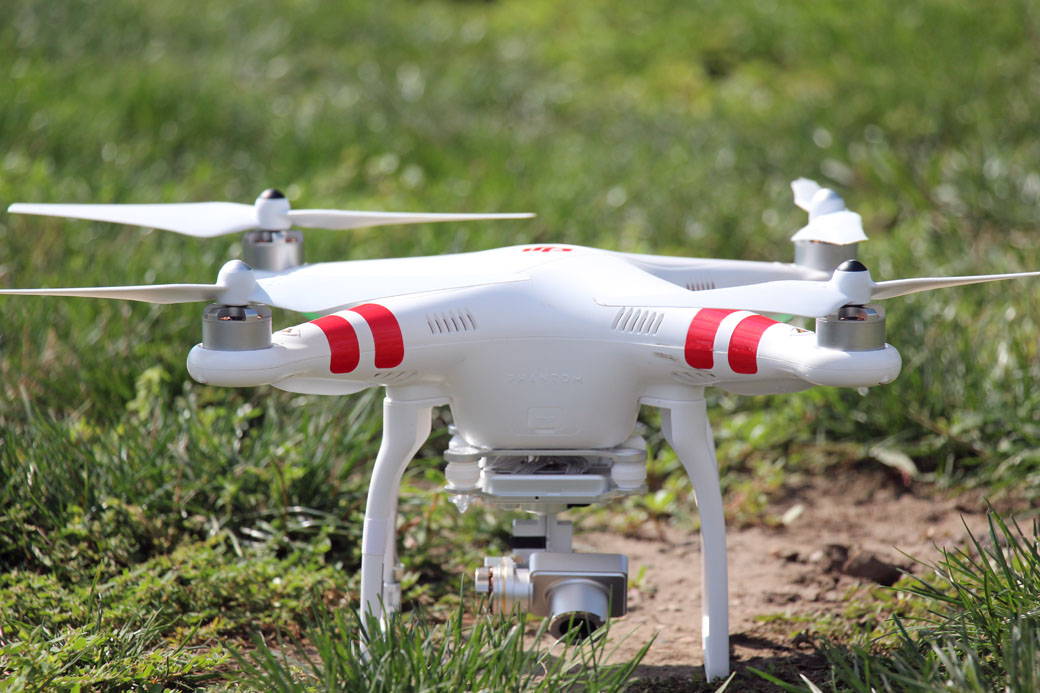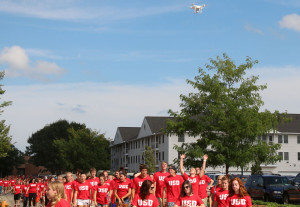
USD buys drone as federal law remains in the air
It’s a bird. It’s a plane. It’s the marketing department’s new drone.
The University of South Dakota purchased its first unmanned aerial vehicle, or drone, less than a month ago. The five-pound device is controlled by USD’s marketing and university relations staff and is the first to be used by a public university’s communication department in the state.
“We just view it as another way to get photos. We’re not really seeing it as going somewhere we couldn’t go on the ground,” said Tena Haraldson, department director.
 Howard Thomas, USD’s digital strategist, flew the $1,300 drone Friday over first-years traveling to the DakotaDome for convocation. Haraldson said the device is intended to capture outdoor campus shots for tailgating and move-in day, but could also be used inside the DakotaDome.
Howard Thomas, USD’s digital strategist, flew the $1,300 drone Friday over first-years traveling to the DakotaDome for convocation. Haraldson said the device is intended to capture outdoor campus shots for tailgating and move-in day, but could also be used inside the DakotaDome.
The white drone includes four propellers that can carry the device to more than 33 mph. A high-definition camera is attached, and the drone uses a gimbal to stabilize the camera as the object is in flight.
The university’s purchase of the small unmanned aircraft comes at a time when national debate about drones, especially for commercial use, is on the rise.
Federal Aviation Administration regulations require some level of approval for anyone wanting to fly a manned or unmanned aircraft. But these regulations are written with passengers in mind and make no differentiation between USD’s drone or a passenger jet.
Drone law that applies to public universities remains up in the air. Officials may apply for a certificate of waiver or authorization to legally operate a drone on campus, but universities using the developing technology are facing legal obstacles to operate within the law.
The University of Nebraska-Lincoln and the University of Missouri-Columbia received cease and desist letters last year to stop flying drones outdoors for journalism, because the faculty members flying the devices were government employees.
Haraldson said USD could receive the same cease and desist letter as officials in Nebraska and Missouri, but Vermillion’s airport is not a controlled air space, so the drone will not be a safety hazard to other aircraft. In the meantime, she said the federal government “can’t expect everyone to sit on their hands and wait to decide.”
“We are not saying we are going to do it until they make us stop. We’re saying that for our very limited use, we don’t expect to be conflicting with anybody,” Haraldson said.
The legality of drone operation is unsure, but some USD students are already embracing the new technology on campus. Sophomore Katie Feller said the university could use the device to determine the most congested walkways and could inform university officials on how to reduce foot traffic.
“I’m sure they’ll use common sense and not be flying the drone around our dorms or anything. And it would be cool to get shots of from a football game or students walking around campus,” Feller said.
Junior Ben Kahler said he does not think privacy issues will arise from the drone’s use.
“It sounds pretty self-explanatory. Don’t use the drone when it’s a private space. If it’s a public event, why not?” Kahler said.
[polldaddy poll=8264216]
Federal regulation change could occur within the next year. Transportation Secretary Anthony Foxx said in July at a luncheon in Washington, D.C., that the FAA would release drone rules by its 2015 deadline.
But Foxx’s inspector general does not agree, and included in a statement to the House’s aviation subcommittee that the federal agency will not meet its deadline because of “a series of complex technological, regulatory and managerial barriers.”
Courts are also whittling away at the FAA’s authority over drone regulation. The U.S. Court of Appeals for the D.C. Circuit ruled July 18 in favor of Texas EquuSearch, a search and rescue group that found the body of a two-year-old boy in March 2012 with a drone in southwest Texas after he went missing five days earlier.
EquuSearch sued the FAA after the company was told by the agency to stop using drones. The group argued that drones should be able to operate for humanitarian purposes.
The South Dakota Pilots Association has not taken a stance on drones, Executive Director Steve Hamilton said. But members are worried about drone users following current FAA guidelines, he said.
“The problem is when people don’t pay attention and fly them too close to a place where you would expect an airplane,” he said.
Farmers in the state are already using drones to monitor their crops and identify stress spots – which could indicate issues such as weed and insect infestation – faster, South Dakota Farm Bureau Executive Director Wayne Smith said. The group advocates for drone use and Smith said the technology should be embraced for agricultural purposes.
“It has a lot of promise,” he said. “If you can identify problems quicker and act as soon as you find it, it’s going to have less of an impact on the crop.”
 Photos: The University of South Dakota marketing and university relations department flies a drone Friday over the class of 2018 before a convocation ceremony in the DakotaDome. (Malachi Petersen/The Volante)
Photos: The University of South Dakota marketing and university relations department flies a drone Friday over the class of 2018 before a convocation ceremony in the DakotaDome. (Malachi Petersen/The Volante)

